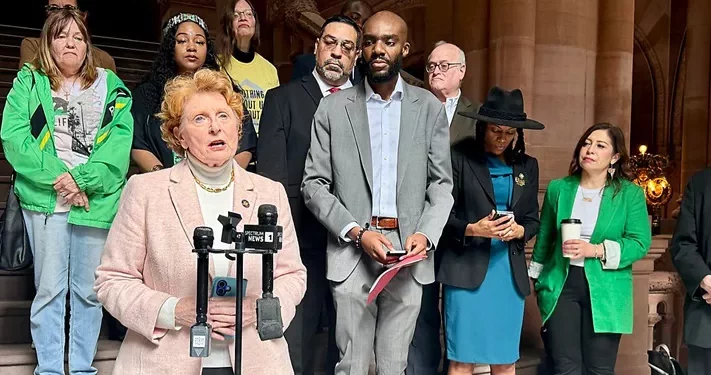New York state leaders are poised to turn their focus back to Governor Kathy Hochul’s controversial proposal to expand forced psychiatric treatment for individuals with severe mental health issues.
On Tuesday, religious leaders gathered at the Capitol to oppose the governor’s plan to change involuntary commitment criteria, a stance that has been largely shared by most Democrats in the Legislature since Hochul introduced her policy agenda in January.
“I’ve seen the consequences when people go without the proper treatment or support after being discharged,” said Chaplain Victoria Phillips, CEO of Visionary Ministries. “This governor has a responsibility to protect all constituents. Forced treatment is not the answer. People can’t thrive without the right resources.”
Hochul remains firm on her key budget priority: making it easier to commit individuals who pose a risk to themselves or others into a hospital for psychiatric care. She wants to clarify the factors clinicians should consider, such as a person’s inability to provide basic needs like food, clothing, or shelter, when determining if someone is at risk of serious harm.
However, critics argue that the lack of adequate services means forcing people into hospitals won’t improve public safety. “You can’t send more people to hospitals if all they’ll get is a quick fix before being sent back to the streets,” said Ruth Lowenkron, director of disability justice at New York Lawyers for the Public Interest. “What’s being solved here? Let’s be realistic.”
In Kingston on Tuesday, the governor addressed the proposal, acknowledging that it was initially considered a long shot. However, she noted that progress has been made in developing standards to help those in need receive the proper hospital care.
“We’re making sure we have the right standards in place so we can take people who really need help and get them the support they need,” she told reporters.
While the debate on involuntary commitment was sidelined last week by discussions on other criminal justice reforms, legislative leaders say talks are continuing behind the scenes. State Senate Deputy Majority Leader Michael Gianaris confirmed that the governor’s office, the Senate, and the Assembly have exchanged budget language, but a compromise is still needed.
“We want to get it done, and I hope the other parties do too,” Gianaris said. “We can reach a final budget agreement.”
The state legislature passed a fifth budget extender on Tuesday, making the annual spending plan more than 15 days late.
Mental health advocates, who joined the religious leaders in protest, emphasized that the budget should include more funding for supportive housing and mental health services. Both the Senate and Assembly are pushing for over $20 million to implement Daniel’s Law, which would create crisis response teams across the state for emergency situations.
Critics argue that forced inpatient treatment disproportionately affects people of color. Assembly Mental Health Committee Chair Jo Anne Simon pointed out that while there are available beds in the state, many individuals in need of psychiatric care struggle to access them.
“So where are they? They’re on the streets or in subway stations,” Simon said.
She also highlighted the challenge of applying hospital-based treatment standards in non-hospital settings. “It’s hard to take a hospital standard and expect police officers, who aren’t trained in mental health care, to handle it,” she said.
Despite the opposition, the governor has made it clear that she will push for her hard-line budget priorities, including changes to involuntary commitment criteria, as long as necessary. However, lawmakers leading the mental health efforts are equally committed to their stance.
“I’m ready to fight until May if I have to,” Simon concluded.
Related Topics:




























